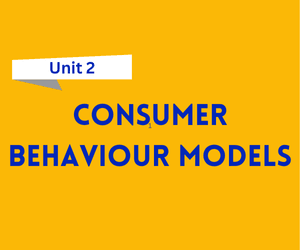When we talk about why people buy what they buy, a big part of the answer lies within the individual. These internal psychological factors shape how consumers think, feel, and act when making purchase decisions. Unlike external influences such as culture or peer pressure, individual determinants come from within a person’s mind and personality. Understanding these factors helps marketers connect with customers on a deeper, more personal level.

Download UNIT 2 – Individual Determinants of Consumer Behaviour Notes
Get simplified revision notes for this unit:
Download Unit 2 Notes PDF
Motivation – The Driving Force Behind Purchases
Motivation is the inner urge that drives a person to satisfy a need. It explains why people choose certain products over others. One of the most famous theories explaining motivation is Maslow’s Hierarchy of Needs. This theory arranges human needs in five levels:
Physiological needs – basics like food, water, and shelter.
Safety needs – security, protection, and stability.
Social needs – love, belonging, and relationships.
Esteem needs – respect, recognition, and self-worth.
Self-actualization – personal growth and fulfilling one’s potential.
For example, a customer buying bread is meeting a basic need, but someone buying a luxury watch may be fulfilling esteem needs or self-actualization desires.
Perception – How Consumers See the World
Perception is the process by which individuals select, organize, and interpret information to create a meaningful picture of the world. Two people can see the same advertisement but interpret it differently based on their past experiences, expectations, and beliefs. This is why brand image and consistent messaging are so important—companies must shape consumer perceptions in their favor.
Learning – Shaping Future Buying Behaviour
Learning in consumer behaviour refers to the changes in a person’s thought process or behaviour that result from experience. Marketers often use learning theories like:
Classical conditioning, where a product is repeatedly associated with a positive feeling (e.g., a perfume ad linked with romance).
Operant conditioning, where rewards or benefits encourage repeat purchases (e.g., loyalty points).
Over time, learning builds habits and brand loyalty.
Attitude Formation and Change
Attitudes are a person’s overall evaluations—favorable or unfavorable—towards a product, brand, or idea. They consist of three components:
Cognitive (beliefs and knowledge),
Affective (feelings and emotions), and
Behavioural (tendency to act).
While attitudes are often stable, marketing campaigns, peer influence, or personal experiences can shift them. For example, a customer may dislike a brand due to past service issues, but a strong new campaign with improved service can change that perception.
Personality Traits and Buying Behaviour
Personality refers to the consistent patterns of thoughts, emotions, and behaviours that make each person unique. Extroverted individuals may prefer vibrant, social products like party wear or travel packages, while introverts might lean toward books, home-based hobbies, or personalized gadgets. Understanding personality helps marketers design products and advertisements that resonate with specific personality types.
Self-Concept – How Consumers See Themselves
Self-concept is the image a person has of themselves. It influences what they buy to express or enhance that image. For example, someone who sees themselves as a fitness enthusiast might invest in gym memberships, protein supplements, and sportswear. Marketing strategies that align products with a consumer’s self-image can be highly persuasive.
Conclusion
Internal psychological factors like motivation, perception, learning, attitudes, personality, and self-concept deeply shape consumer behaviour. By understanding these elements, businesses can create marketing messages that speak directly to a consumer’s inner world, influencing not only what they buy but also how they feel about the purchase. In the end, successful marketing is about connecting a product with the personal values and inner drives of the customer.
